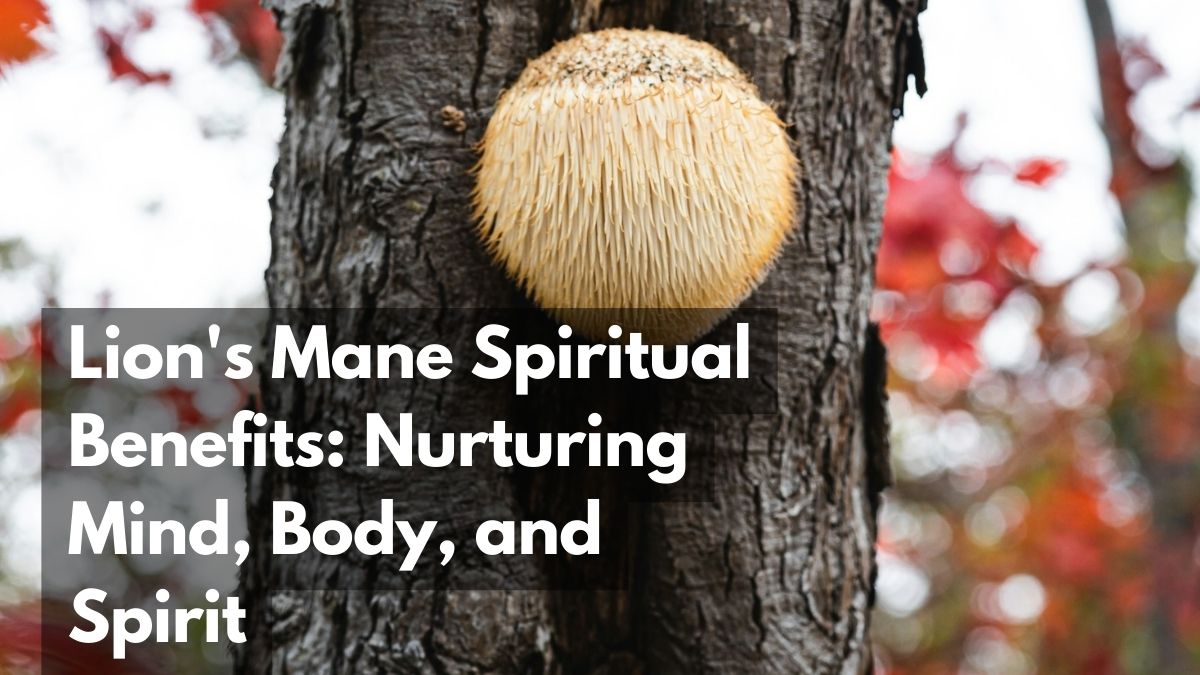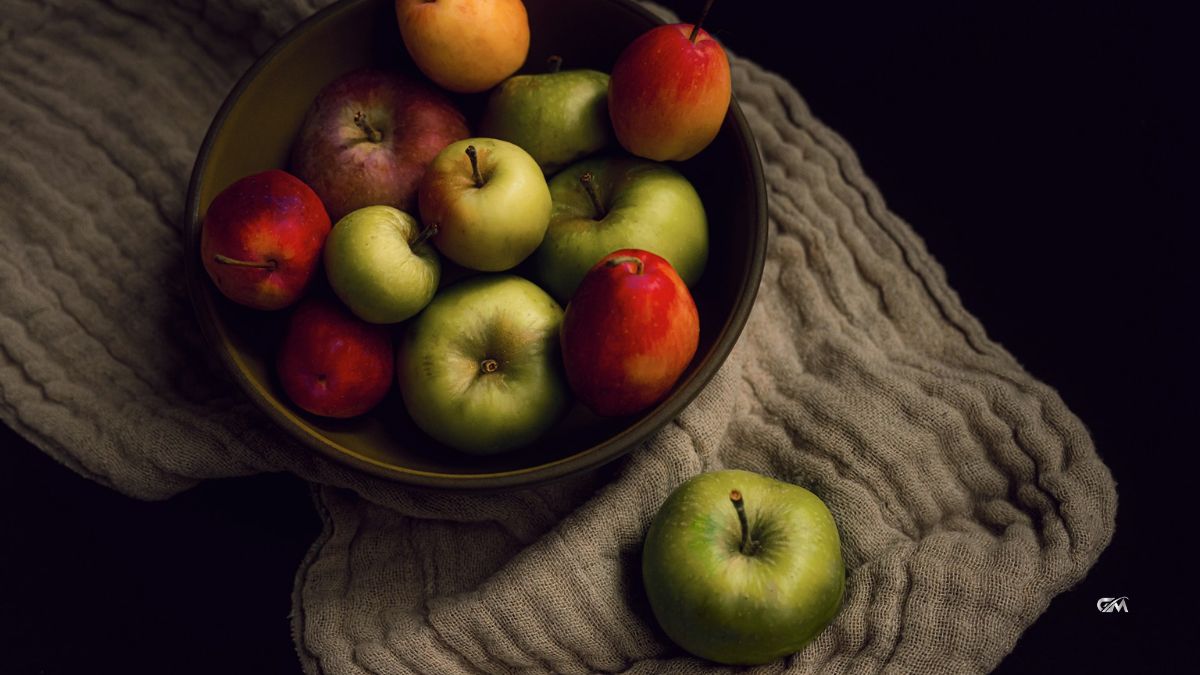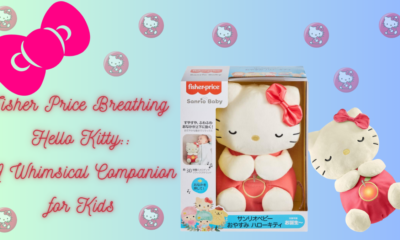Health & fitness
Lion’s Mane Spiritual Benefits: Nurturing Mind, Body, and Spirit

Lion’s mane spiritual benefits: The Hericium erinaceous fungus, more often known as Lion’s Mane, has a long history of veneration due to its supposed medicinal properties. New research delves into the spiritual advantages of this rare fungus, in addition to its well-documented effects on cognitive performance. Let’s explore the mythical aspects of Lion’s Mane by drawing on tradition, science, and personal stories.
The Roots of Lion’s Mane in Traditional Medicine
Many different civilizations have used Lion’s Mane for its healing qualities for ages. Its function in fostering energy and spiritual wellness is emphasized in ancient Asian writings. Because of its shaggy look, people believed that the mushroom might bring them insight and wisdom.
Understanding Lion’s Mane Composition
Hericenones and erinacines are two examples of the bioactive substances found in Lion’s Mane. Researchers are looking at these chemicals for their effects on brain health, but they may also have a role to play in enhancing spiritual experiences. The complex relationship between the mind and soul may have a friend in Lion’s Mane’s chemical composition.
Scientific Studies on Lion’s Mane and Spirituality
Lion’s mane spiritual benefits: Intriguing discoveries have been uncovered by recent scientific investigations. According to research, Lion’s Mane may affect the brain regions responsible for processing spiritual events. Research on the possible connection between Lion’s Mane and increased spirituality is still in its early stages, but it is an intriguing subject that deserves further investigation.
Lion’s Mane and Brain Health Connection
The cognitive benefits of Lion’s Mane are causing its fans to experience an unexpected side effect: a deep connection to their spiritual self. With better mental acuity comes the possibility of deeper self-reflection, which in turn leads to a more fulfilling spiritual path.
The Spiritual Journey: Lion’s Mane and Meditation
Just picture the ancient art of meditation merging with the cutting-edge knowledge of Lion’s Mane’s medicinal properties. Evidence from anecdotal sources points to a synergistic impact, with users describing more profound and enlightening experiences. It’s as though the celestial and the terrestrial are united by Lion’s Mane.
Unlocking Creativity with Lion’s Mane
Spiritual discovery and creativity frequently go hand in hand. You may find the secret to realizing your artistic potential in Lion’s Mane, a herb known to enhance creative thinking. Many artists believe that the altered mental state made possible by Lion’s Mane is responsible for their groundbreaking concepts.
Lion’s Mane and Stress Reduction
The spiritual growth enemy, stress, meets a strong foe in Lion’s Mane. This mushroom is a helpful travel partner on the road to spiritual health since it promotes calm and lowers cortisol levels. A tranquil state of mind allows for increased openness to enlightening encounters.
Incorporating Lion’s Mane into Daily Life
Integrating Lion’s Mane into your regimen doesn’t need to be difficult. It is essential to discover a way that works for your lifestyle, whether it’s through supplements, teas, or culinary creations. There may be long-term spiritual advantages to taking little, regular amounts. For those who enjoy a more hands-on approach, consider growing your own Lion’s Mane mushrooms. Grow kits and wood-based mushroom substrates make cultivating fresh, delicious mushrooms at home easy and rewarding. You’ll enjoy the satisfaction of growing your own medicinal food.
User Testimonials
True tales give Lion’s Mane its full potential. People talk about how this mushroom sparked a new path in their spiritual lives. Many who have experienced the life-altering effects of Lion’s Mane have described feelings of heightened awareness and deep inner calm.
Precautions and Considerations
Proceed with caution while working with Lion’s Mane, even if it seems like a good spiritual ally. Anyone taking medication or has a preexisting medical condition should talk to their doctor before making any changes. Furthermore, a risk-free investigation is guaranteed when possible side effects are known.
Choosing the Right Lion’s Mane Product
There is a wide range in quality among the many Lion’s Mane goods available. If you want to get the most out of it, go with trusted brands. To make a well-informed choice on the product that suits your spiritual needs, check for certificates and read reviews written by previous customers.
DIY Lion’s Mane Recipes for Spiritual Well-being
Incorporate culinary inventions into your Lion’s Mane experience to make it more diverse. Experimenting with recipes, whether they be for delicious foods or calming drinks, may bring a fun element to your spiritual regimen. In and of itself, making and eating these treats becomes a form of mindfulness.
Common Myths About Lion’s Mane
To encourage well-informed choices, it is essential to debunk myths. False claims or high expectations, which are common misconceptions, might make it hard to see the true advantages of Lion’s Mane. If consumers can keep their expectations in check, they will approach this mushroom with the right mindset.
Conclusion
An intriguing friend, Lion’s Mane arises in the domain of spiritual investigation. The evolution of the mushroom mirrors the human pursuit for enlightenment, from long-standing customs to modern science. You may find that Lion’s Mane is a helpful companion on your journey of self-discovery and spiritual growth.
FAQs
Q: Is it okay to eat Lion’s Mane every day?
The usage of Lion’s Mane on a daily basis is often regarded as safe. However, to find the correct dose for your specific requirements, it is recommended that you speak with a healthcare provider.
Q: Are ancient spiritual practices superseded by Lion’s Mane?
Spiritual activities can be enhanced by Lion’s Mane, but it should not be used in place of more conventional approaches. Cognitive function and spiritual experiences may be supported.
Q: What is the expected timeframe for the spiritual advantages of Lion’s Mane?
People react differently. The time it takes for some people to feel better could vary. To maximize its potential, use consistently.
Q: Can you tell me whether a medicine has any side effects?
Talk to your doctor, particularly if you are on any kind of medicine. For your safety, consult a medical expert before using Lion’s Mane if you are taking any medications that may interact with it.
Q: How can I know which Lion’s Mane items are of the highest quality?
The best places to get high-quality Lion’s Mane supplements are trustworthy health food stores, internet marketplaces, and personal referrals from doctors and other medical experts.
Health & fitness
MyCardioForLife.com

MyCardioForLife.com: Welcome to MyCardioForLife.com! In the event that you’re energetic about keeping a sound way of life, you’ve come to the perfect locations. Our blog is your go-to asset for everything connected with home wellness, nutritious food, generally wellbeing, cardio exercises, health rehearses, and adjusted residing. How about we make a plunge and investigate how you can work on your existence with our extensive aide.
MyCardioForLife.com: Home Fitness
Benefits of Home Fitness: Home wellness offers accommodation, adaptability, and security. You can work out whenever without the need to travel, and designer your schedules to accommodate your timetable and wellness level. Furthermore, it’s a practical arrangement contrasted with costly rec center participations.
Creating a Home Gym
Essential Equipment: Begin with nuts and bolts like free weights, opposition groups, a yoga mat, and a leap rope. These things are flexible and can uphold different exercises. Blonde Puss
Financial plan Well disposed Choices: On the off chance that you’re on a careful spending plan, search for recycled hardware on the web or get inventive with family things like water bottles as loads.
Effective Home Workout Routines
Strength Training: Integrate bodyweight practices like push-ups, squats, and jumps. These activities develop muscle fortitude and perseverance without requiring significant burdens.
Cardio Activities: Cardio doesn’t need a lot of room. Have a go at hopping jacks, high knees, or moving to your number one music for a tomfoolery and viable exercise.
MyCardioForLife.com: Food
Importance of a Balanced Diet: A reasonable eating routine fills your body, upholds your invulnerable framework, and keeps your energy levels stable. It’s the groundwork of good wellbeing.
Solid Recipes for Occupied Individuals
Breakfast Thoughts: Launch your day with a nutritious smoothie or short-term oats. These choices rush to plan and loaded with nutrients.
Speedy Snacks: Plan straightforward plates of mixed greens with lean proteins like chicken or tofu, and change it up of vivid vegetables.
Supper Recipes: Select one-dish feasts that consolidate proteins, veggies, and entire grains. Think sheet skillet chicken with broiled vegetables.
Dinner Arranging Tips: Plan your dinners for the week to save time and lessen pressure. Bunch cooking and utilizing extras innovatively can likewise assist you with adhering to a good dieting plan.
MyCardioForLife.com: Health
Understanding Overall Health: Wellbeing is something other than the shortfall of illness. It includes physical, mental, and social prosperity.
Ways to keep up with Great Wellbeing: Remain hydrated, get customary activity, and set aside a few minutes for unwinding. These straightforward practices can hugely affect your wellbeing.
Psychological wellness Matters
Stress The executives Strategies: Practice profound breathing, reflection, or yoga to diminish pressure. Finding leisure activities that loosen up you can likewise be gainful.
Care Practices: Care includes being available at the time. It can work on your psychological clearness and close to home flexibility.
MyCardioForLife.com: Cardio
The Importance of Cardiovascular Exercise: Cardio practices fortify your heart and lungs, help your digestion, and work on your general wellness.
Best Cardio Exercises to Do at Home
Extreme cardio exercise (HIIT): HIIT includes short explosions of serious activity followed by rest. It’s exceptionally successful for consuming calories and working on cardiovascular wellbeing.
Low-Effect Cardio Choices: Assuming that you have joint issues, attempt low-influence practices like lively strolling, cycling, or swimming.
Keeping tabs on Your Development: Keep an exercise diary or use wellness applications to screen your advancement and remain inspired.
MyCardioForLife.com: Wellness
Holistic Approach to Wellness: Wellbeing is a comprehensive idea that incorporates actual wellbeing, mental lucidity, and profound equilibrium.
Integrating Wellbeing into Day to day existence: Roll out little improvements like rehearsing appreciation, remaining hydrated, and carving out opportunity for taking care of oneself.
Taking care of oneself Practices
Significance of Rest: Hold back nothing long stretches of rest each evening. Quality rest is fundamental for recuperation and by and large wellbeing.
Unwinding Procedures: Attempt exercises like perusing, cleaning up, or rehearsing yoga to loosen up and de-stress.
Nutrition
Basics of Good Nutrition: Great sustenance includes devouring various food sources to get the important supplements your body needs.
Macronutrients versus Micronutrients: Macronutrients incorporate proteins, fats, and carbs, while micronutrients are nutrients and minerals. Both are fundamental for wellbeing.
Superfoods to Remember for Your Eating routine: Consolidate food sources like berries, mixed greens, nuts, and seeds. These superfoods are wealthy in supplements and cell reinforcements.
Normal Sustenance Legends Exposed: Try not to succumb to fantasies like “carbs are awful” or “you really want to detox.” Adjusted eating and control are critical.
Lifestyle
Creating a Healthy Lifestyle: A solid way of life is tied in with making steady, positive decisions that improve your prosperity.
Adjusting Work and Individual Life: Put down stopping points, focus on undertakings, and set aside a few minutes for exercises you appreciate to keep a solid balance between serious and fun activities.
Building Healthy Habits
Morning Routines: Begin your day with exercises that invigorate you, like a sound breakfast, exercise, or contemplation.
Evening Schedules: Wind down with loosening up exercises like perusing or paying attention to music to guarantee a decent night’s rest.
Conclusion
Carrying on with a sound way of life doesn’t need to be confounded. By integrating wellness, nutritious food, health rehearses, and a decent way to deal with day to day existence, you can upgrade your prosperity. Embrace these tips and roll out little improvements that lead to a better, more joyful you.
FAQs
Q: What is the best home exercise routine daily schedule for amateurs?
Begin with bodyweight practices like push-ups, squats, and thrusts. Consolidate short cardio meetings like bouncing jacks or high knees.
Q: How might I eat sound on a limited financial plan?
Plan your dinners, purchase in mass, and pick occasional produce. Basic, entire food sources are much of the time more reasonable and better.
Q: What are straightforward ways of lessening pressure?
Practice care, participate in leisure activities, work-out routinely, and guarantee you get sufficient rest.
Q: How frequently would it be a good idea for me to do cardio exercises?
Go for the gold 150 minutes of moderate-power or 75 minutes of focused energy cardio each week, as suggested by wellbeing rules.
Q: Are supplements essential for good sustenance?
Enhancements can assist with filling healthful holes, however it’s ideal to get your supplements from a reasonable eating routine whenever the situation allows.
Health & fitness
kingymab: An Overview

What is Kingymab?
Kingymab is a state of the art wellness gadget that consolidates the viability of conventional obstruction preparing with the comfort of current innovation. It comprises of a minimal, versatile unit furnished with customizable obstruction groups and high level sensors.
How does Kingymab work?
It is basic yet powerful to Utilize Kingymab. The gadget interfaces remotely to your cell phone or tablet, where you can get to a large number of directed exercises and customized preparing programs. As you perform works out, Kingymab tracks your developments and gives ongoing input to guarantee appropriate structure and procedure.
Benefits of Kingymab
Accommodation: Express farewell to swarmed rec centers and massive hardware. With Kingymab, you can work out whenever, anyplace.
Flexibility: Whether you’re a fledgling or an accomplished competitor, Kingymab offers exercises custom fitted to your wellness level and objectives.
Viability: With its inventive obstruction innovation, Kingymab conveys results quicker than conventional exercises, assisting you with developing fortitude, tone muscles, and work on in general wellness. Wall Shelves
How to Use Kingymab Effectively
To take advantage of your Kingymab experience, follow these tips:
Setting up Kingymab
Prior to beginning your exercise, try to appropriately set up your Kingymab gadget as per the producer’s directions. This incorporates changing the opposition groups to your ideal level and it are safely joined to guarantee that the sensors.
Tips for maximizing results with Kingymab
Remain predictable: Like any wellness schedule, consistency is critical. Intend to integrate Kingymab into your everyday or week by week plan for ideal outcomes.
Stand by listening to your body: Focus on how your body answers each activity and change the obstruction depending on the situation. Make sure to enjoy reprieves and rest when important.
Stir it up: Keep your exercises intriguing by attempting various activities and schedules. This forestalls weariness as well as difficulties your muscles in new ways.
Common mistakes to avoid with Kingymab
Overtraining: While it’s vital to propel yourself, overtraining can prompt injury and burnout. Pay attention to your body’s signs and give yourself satisfactory rest between exercises.
Unfortunate structure: To augment the adequacy of each activity and decrease the gamble of injury, center around keeping up with legitimate structure and procedure consistently.
Overlooking input: Focus on the criticism given by Kingymab during your exercises. This will assist you with recognizing regions for development and make important changes.
Kingymab: The Future of Fitness
With its progressive innovation and unequaled accommodation, Kingymab is ready to reshape the manner in which we approach wellness. Here’s the reason it’s the eventual fate of the business:
Kingymab vs. Traditional Fitness Methods
Not at all like conventional rec center exercises that require costly participations and massive hardware, Kingymab offers a savvy and space-saving other option. With its compact plan and remote availability, you can take your exercises any place life takes you.
Testimonials from Kingymab Users
Be that as it may, don’t simply blindly trust us. Hear what clients need to say regarding their involvement in Kingy’mab:
“I’ve attempted endless wellness items throughout the long term, however nothing comes near Kingy’mab. It’s helpful, viable, and enjoyable to utilize!”
“On account of Kingy’mab, I’ve had the option to remain predictable with my exercise routines in any event, while going for work. It’s genuinely a unique advantage!”
The potential impact of King’ymab on the fitness industry
As additional individuals find the advantages of King’ymab, we can hope to see a shift towards more customized and open wellness arrangements. From occupied experts to wellness fans, Kingy’mab brings something to the table for everybody.
Conclusion
All in all, Kingymab isn’t simply a wellness gadget – it’s a way of life. With its creative innovation, accommodation, and viability, it’s altering the manner in which we ponder remaining fit and solid.
FAQs
Q: Is Kin’gymab appropriate for all wellness levels?
Indeed, King’ymab offers exercises and projects custom fitted to people of all wellness levels, from novices to cutting edge competitors.
Q: Might Kingy’mab at any point supplant conventional exercise center exercises?
While King’ymab offers a helpful option in contrast to conventional rec center exercises, it can supplement as opposed to supplant them completely. It’s at last up to individual inclination and wellness objectives.
Q: How before long could I at any point hope to get results with Kingy’mab?
Results might fluctuate relying upon variables like consistency, force, and diet. Notwithstanding, numerous clients report recognizable upgrades in strength and wellness inside half a month of customary use.
Q: Is King’ymab protected to utilize?
Indeed, King’ymab is planned considering security and goes through thorough testing to guarantee quality and dependability. Similarly as with any activity program, it means quite a bit to utilize legitimate structure and strategy to forestall injury.
Q: What makes King’ymab novel contrasted with other wellness items?
Kingy’mab stands apart for its mix of conveyability, adaptability, and trend setting innovation. Not at all like customary wellness hardware, it offers a consistent client experience with constant input and customized exercises.
Health & fitness
Oridzin: The Antioxidant Powerhouse in Your Fruit Basket

Have you ever wondered what gives apples their vibrant colors and remarkable health benefits? The secret lies in a little-known antioxidant called Oridzin. Nestled within the flavonoid family, Oridzin is a powerful compound predominantly found in various fruits, especially apples. Despite its discreet presence, this antioxidant plays a crucial role in our health, offering anti-inflammatory and immunomodulatory properties. In this article, we’ll delve into what exactly Oridzin is, its health benefits, and why it deserves a spot in your daily diet.
What Exactly is Oridzin?
Oridzin is a type of flavonoid, a group of naturally occurring compounds found in fruits and vegetables known for their antioxidant properties. Chemically, it’s a polyphenolic compound, which means it has multiple phenol units in its structure. This configuration allows Oridzin to neutralize free radicals, molecules that can damage cells and contribute to aging and diseases. News Jotechgeeks
The Discovery of Oridzin
The journey to uncover Oridzin’s secrets began decades ago. Researchers studying the health benefits of fruits stumbled upon this compound and noted its potential. Early studies focused on its antioxidant properties, but as research progressed, scientists discovered its broader health implications. Key researchers in this field have published numerous studies, highlighting Oridzin’s multifaceted benefits.
Oridzin in the Flavonoid Family
Flavonoids are a diverse group of phytonutrients (plant chemicals) found in almost all fruits and vegetables. They are responsible for the vivid colors of these foods and contribute significantly to their health benefits. Oridzin stands out within this family due to its potent antioxidant activity. Compared to other flavonoids like quercetin and kaempferol, Oridzin has shown unique properties that make it a subject of interest in nutritional science and pharmacology.
Health Benefits of Oridzin
Antioxidant Properties: At the core of Oridzin’s benefits is its antioxidant capability. Antioxidants protect your body from oxidative stress, which is an imbalance between free radicals and antioxidants in your body. This stress can lead to cellular damage and is linked to various chronic conditions, including heart disease and cancer.
Cardiovascular Health: Oridzin’s antioxidant properties extend to heart health. It helps in reducing the oxidation of LDL cholesterol, often referred to as “bad” cholesterol. Oxidized LDL is a key player in the development of atherosclerosis, a condition characterized by the hardening of arteries. By preventing this oxidation, Oridzin can help maintain healthy blood vessels and reduce the risk of heart disease.
Skin Health: Oridzin’s benefits are skin-deep too. Its antioxidant properties help protect the skin from UV-induced damage. UV radiation can lead to premature aging and increase the risk of skin cancer. By neutralizing the free radicals generated by UV exposure, Oridzin can help maintain youthful and healthy skin.
Oridzin and Inflammation
Anti-inflammatory Properties: Chronic inflammation is at the root of many diseases, including arthritis, diabetes, and even Alzheimer’s. Oridzin exhibits strong anti-inflammatory properties, making it a valuable compound in managing these conditions. It works by inhibiting the production of pro-inflammatory molecules in the body.
Mechanisms of Action: Oridzin’s anti-inflammatory effects are primarily mediated through its interaction with various signaling pathways in the body. It can inhibit the activity of NF-kB, a protein complex that plays a key role in regulating the immune response to infection. By doing so, Oridzin reduces the production of inflammatory cytokines, which are signaling molecules that promote inflammation.
Research Studies: Numerous studies have demonstrated Oridzin’s anti-inflammatory effects. For instance, research published in the “Journal of Nutritional Biochemistry” showed that Oridzin could significantly reduce inflammation in animal models of arthritis. Such findings highlight the potential of Oridzin as a natural remedy for inflammatory conditions.
Immunomodulatory Effects
Impact on the Immune System: Oridzin doesn’t just fight inflammation; it also modulates the immune system. This means it can help balance immune responses, making it particularly beneficial for individuals with autoimmune diseases, where the immune system mistakenly attacks the body’s own tissues.
Potential Benefits in Autoimmune Conditions: Autoimmune diseases like rheumatoid arthritis and lupus involve chronic inflammation and tissue damage. By modulating immune responses and reducing inflammation, Oridzin may offer relief to patients suffering from these conditions. However, more clinical trials are needed to fully understand its efficacy and safety in this context.
Clinical Evidence: Preliminary clinical studies suggest that Oridzin could be a promising therapeutic agent. For example, a study in the “Journal of Clinical Immunology” reported that patients with autoimmune conditions experienced reduced symptoms and improved quality of life after supplementing with Oridzin. These findings pave the way for more comprehensive clinical trials.
Oridzin in Apples
Concentration in Different Apple Varieties: Apples are one of the richest sources of Oridzin. However, the concentration of this antioxidant can vary significantly between different apple varieties. For instance, red apples tend to have higher Oridzin levels compared to green ones. This variation is also influenced by factors such as cultivation methods and storage conditions.
Role in Apple Coloration: Oridzin contributes to the vibrant coloration of apples. The compound is particularly abundant in the skin of the fruit, giving red apples their distinctive hue. This coloration is not just for aesthetic appeal; it indicates the presence of beneficial antioxidants.
Nutritional Significance: Including apples in your diet is a delicious way to boost your Oridzin intake. These fruits offer a convenient and tasty source of antioxidants that can help protect your health. Eating the skin is especially important, as it contains the highest concentration of Oridzin.
Extraction and Processing
Methods of Extraction: To harness Oridzin’s benefits on a larger scale, efficient extraction methods are essential. Common techniques include solvent extraction and supercritical fluid extraction. These methods ensure that the maximum amount of Oridzin is obtained from the fruit.
Purification Techniques: Once extracted, Oridzin needs to be purified to ensure its effectiveness and safety. Techniques like chromatography are used to isolate Oridzin from other compounds. This purification process is crucial for producing high-quality supplements and pharmaceuticals.
Industrial Applications: Oridzin’s potent antioxidant and anti-inflammatory properties make it valuable in various industries. In the food industry, it’s used as a natural preservative to extend shelf life. In cosmetics, it’s added to products to protect the skin from oxidative damage. The pharmaceutical industry is also exploring its potential for developing new drugs.
Pharmacological Potential
Therapeutic Uses: Oridzin holds promise for several therapeutic applications. Its antioxidant properties can be harnessed to develop treatments for diseases caused by oxidative stress, such as neurodegenerative disorders. Additionally, its anti-inflammatory and immunomodulatory effects open up possibilities for managing chronic inflammatory and autoimmune conditions.
Drug Development Prospects: The pharmaceutical industry is increasingly interested in natural compounds like Oridzin. Researchers are exploring its potential as a lead compound for developing new drugs. By understanding its mechanisms of action, scientists aim to create targeted therapies that maximize its benefits.
Safety and Efficacy: While Oridzin shows great promise, it’s essential to ensure its safety and efficacy through rigorous testing. Preliminary studies have shown that Oridzin is generally well-tolerated, but more extensive clinical trials are needed to establish its long-term safety profile.
Dietary Sources of Oridzin
Foods Rich in Oridzin: Aside from apples, Oridzin is found in other fruits such as grapes, berries, and citrus fruits. Including a variety of these fruits in your diet can help you obtain sufficient Oridzin. It’s also present in smaller amounts in vegetables like onions and kale.
Dietary Supplements: For those who may not get enough Oridzin through their diet, supplements are available. These supplements can provide a concentrated dose of the antioxidant, making it easier to meet your daily needs. However, it’s always best to consult with a healthcare professional before starting any new supplement regimen.
Recommended Intake: There’s no established daily recommended intake for Oridzin yet. However, incorporating a variety of fruits and vegetables into your diet is a safe and effective way to ensure you get enough of this beneficial compound. Aim for at least five servings of fruits and vegetables per day.
Oridzin in Traditional Medicine
Historical Uses: Oridzin has a long history of use in traditional medicine. Ancient cultures recognized the health benefits of consuming fruits rich in this compound. They used these fruits to treat various ailments, from digestive issues to skin problems.
Cultural Significance: In many cultures, fruits containing Oridzin hold symbolic significance. For example, apples are often associated with health and longevity in folklore. This cultural reverence underscores the long-standing recognition of their health benefits.
Modern Reinterpretations: Today, modern science is validating the traditional uses of Oridzin-rich fruits. Research continues to uncover new health benefits, providing a scientific basis for their historical significance. This blend of tradition and modernity highlights the enduring value of natural compounds like Oridzin.
Scientific Research and Future Directions
Current Studies: Research on Oridzin is ongoing, with scientists exploring its potential in various health conditions. Current studies are examining its effects on cancer, neurodegenerative diseases, and metabolic disorders. These investigations aim to uncover new therapeutic applications and deepen our understanding of this compound.
Gaps in Knowledge: Despite the progress made, there are still gaps in our knowledge about Oridzin. More research is needed to fully understand its mechanisms of action and long-term effects. Addressing these gaps will be crucial for developing effective and safe applications.
Future Research Avenues: Future research on Oridzin should focus on its clinical applications, particularly in chronic diseases. Long-term studies are needed to evaluate its safety and efficacy. Additionally, exploring its interactions with other dietary compounds could reveal synergistic effects that enhance its health benefits.
Potential Side Effects and Interactions
Known Side Effects: Oridzin is generally considered safe, but some individuals may experience side effects. These can include digestive upset or allergic reactions, particularly if consuming large amounts of Oridzin-rich foods or supplements.
Drug Interactions: Oridzin may interact with certain medications. For example, its antioxidant properties could affect the efficacy of chemotherapy drugs. If you’re taking any medications, it’s important to discuss potential interactions with your healthcare provider.
Precautionary Measures: To minimize the risk of side effects and interactions, it’s advisable to consume Oridzin as part of a balanced diet rather than relying solely on supplements. If you have any health conditions or are on medication, consult with a healthcare professional before making significant changes to your diet or supplement regimen.
Conclusion
Oridzin is a remarkable antioxidant with a wide range of health benefits. From protecting your heart and skin to modulating your immune system, this compound offers significant potential. Found predominantly in apples, Oridzin is a testament to the power of natural compounds in promoting health and wellness. As research continues to unfold, we can look forward to discovering even more about this intriguing antioxidant and its role in our health.
FAQs
Q: What foods contain the highest levels of Ori’dzin?
Apples, particularly red varieties, are the richest sources of Ori’dzin. Other fruits like grapes, berries, and citrus fruits also contain this antioxidant.
Q: Can Ori’dzin supplements replace a healthy diet?
While Ori’dzin supplements can help boost your intake, they should not replace a balanced diet. Whole foods provide a range of nutrients that work synergistically to support health.
Q: Are there any known allergies to Ori’dzin?
Allergies to Ori’dzin itself are rare, but some individuals may have allergies to the fruits containing it. If you have known fruit allergies, consult with a healthcare professional before increasing your intake.
Q: How does Ori’dzin compare to other antioxidants?
Ori’dzin is particularly notable for its strong antioxidant and anti-inflammatory properties. While other antioxidants like vitamin C and E are also beneficial, Orid’zin offers unique health benefits, especially in modulating the immune system.
Q: Is it safe to consume Or’idzin daily?
Yes, consuming Ori’dzin through a diet rich in fruits and vegetables is safe and beneficial. If opting for supplements, it’s best to consult with a healthcare professional to ensure appropriate dosage and safety.
-

 Art9 months ago
Art9 months agoHunting SVG: A Digital Frontier in Design
-

 Entertainment6 months ago
Entertainment6 months ago欧乐影院: Elevating Your Streaming Experience
-

 Uncategorized5 months ago
Uncategorized5 months ago翻譯社 推薦 中翻韓
-

 Health & fitness9 months ago
Health & fitness9 months agoAlevemente: The Shocking Truth About it
-

 Art9 months ago
Art9 months agoFisher Price Breathing Hello Kitty: A Whimsical Companion for Kids
-

 Technology9 months ago
Technology9 months agoAM2023x: Unlocking the Future
-

 Entertainment2 weeks ago
Entertainment2 weeks agoOllyhibs: A TikTok Star’s Influence on the Sports Industry
-

 Education9 months ago
Education9 months ago“Oru Rizzardi Peteando con Su Amiga Guadaaragonn” all about this phrase
